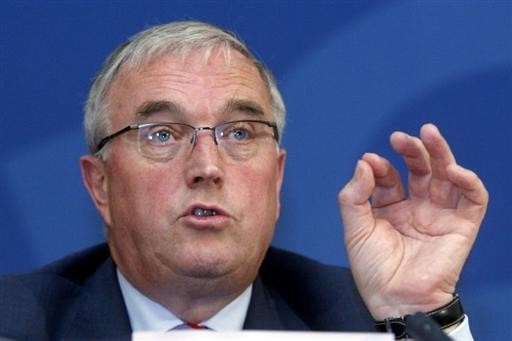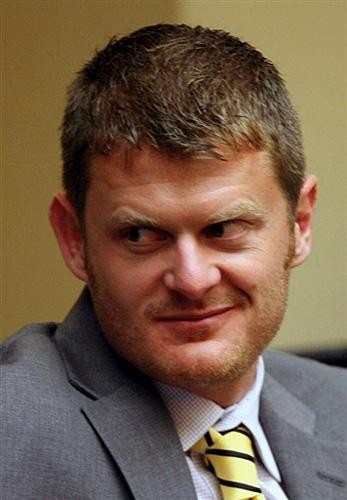McQuaid: Landis case shows that it's not worth taking the risk
By Shane Stokes Floyd Landis made history on Thursday, although it is not the kind of statistic that...


UCI President responds to USADA decision
By Shane Stokes
Floyd Landis made history on Thursday, although it is not the kind of statistic that he will embrace or wish to have remembered. The American became the first Tour de France winner to be disqualified for doping, losing his crown after the USADA found him guilty of using testosterone during the 2006 Tour de France.
UCI President Pat McQuaid learned the decision on Thursday evening and gave his reaction to the news afterwards, saying that the fact that Landis is such a big name shows that there is a no-tolerance approach in the sport.
"This is a sign that doping will not be allowed," he told Cyclingnews. "It is a sign that anybody who is prepared to take the risk, be they the yellow jersey of the Tour de France or the lanterne rouge, will be caught by the system.
"There are guys prepared to take a chance, particularly for the ultimate event which is the Tour de France. But it doesn't work. After all, this is the race winner from last year who is being caught, and this year a couple of the big favourites were caught as well. It shows that the risk is not worth it any more...sooner or later these guys are going to realise that fact. Things are getting better and the testing system is improving all the time."
As the Exum case showed, in the past some high profile Olympic-bound athletes in other sports have had positive test results covered up. McQuaid said that the fact that cycling is willing to take on and suspend the biggest names means that there is clear transparency and a real will to tackle the problem.
Get The Leadout Newsletter
The latest race content, interviews, features, reviews and expert buying guides, direct to your inbox!
"Whoever they are, they will be hit [if doping]. There will be absolutely no covering up," he stated, explaining that there is also the chance of riders passing tests now but being caught further down the line when better technologies are developed. "We are even prepared to put stuff in storage for testing afterwards - that will be done at the world championships, and we did the same at the Tour de France.
"A number of blood samples have been put in storage for eventual examination once the test comes for human growth hormone. We have been told that that test will be validated by either the end of this year or very early next year. We have samples from the Tour de France and we will also have samples from the world championships, waiting for that test to be validated. If any guys have been using growth hormone, they will be caught.
"It is a sign that we are prepared to tolerate nothing, a sign that we are prepared to do the maximum to catch guys who are doping."
Landis case 'proves system works'
Despite some concerns raised by the USADA arbitrators in their judgement as regards to the LNDD's handling and analysis of the samples, McQuaid feels that the decision shows that overall, the anti-doping system is functioning well.
"Today's news is good news for the UCI. It proves that the UCI's anti-doping system works, and more importantly, that the testing system works. That testing system was put under a huge amount of scrutiny by Landis's lawyers over the past 12 months. They went into minute detail trying to prove that system inefficient or incorrect, and they didn't succeed.
"It is good from that point of view. It is good for cycling and good for the sport. It is unfortunate that the first ever winner of the Tour de France has been proven positive, but the most important aspect of it for us is that it shows that the testing system works and so too the doping controls."
Much of Landis' defence was based around raising questions about the LNDD lab and how the sample was analysed. During the trial several issues were highlighted and Thursday's ruling saw the USADA seeming to agree with at least some of these concerns. It decided not to use the positive testosterone:epitestosterone result because of the way things were done in the lab, but instead judged Landis guilty on the basis of the follow-up IRMS examination for synthetic testosterone.
McQuaid admits that some modifications should be made, but feels that the system still uncovered the truth. "There are possibly things that need to be changed," he stated. "You cam always get an element of human error where there are humans involved, but the fact is that they had enough evidence there to prove that he was positive. That is the most important thing."
Landis still has one final chance to salvage his name and rescue his yellow jersey. He can appeal to CAS and, if successful, he would be back in the picture as the 2006 Tour winner. However McQuaid feels confident that the UCI will win out, even if an appeal is lodged.
"I would be confident that the verdict will stand if it is appealed," he said. "It is up to Floyd now...he has got a month now to decide whether he wants to appeal or not. So we should let him make up his own mind. If he does go to CAS, though, we wouldn't be overly concerned."
Cyclingnews' coverage of the Floyd Landis case
September 28, 2008 - Landis takes case to US federal court
September 10, 2008 - Landis signing with current Health Net-Maxxis team for 2009
July 1, 2008 - CAS delivers final blow to Landis legal challenge
June 30, 2008 - Landis loses final appeal
June 28, 2008 - Landis decision due Monday
March 12, 2008 - Landis' judgment day nears
October 21, 2007 - Landis files appeal with CAS
October 18, 2007 - AFLD takes another look at Landis case
Thursday, October 11 - Landis continues fight, appeals to CAS
Saturday, September 22 - UCI officially names Pereiro 2006 Tour champion, Landis case raises issues
Friday, September 21 - Landis' appeal denied, two year suspension levied